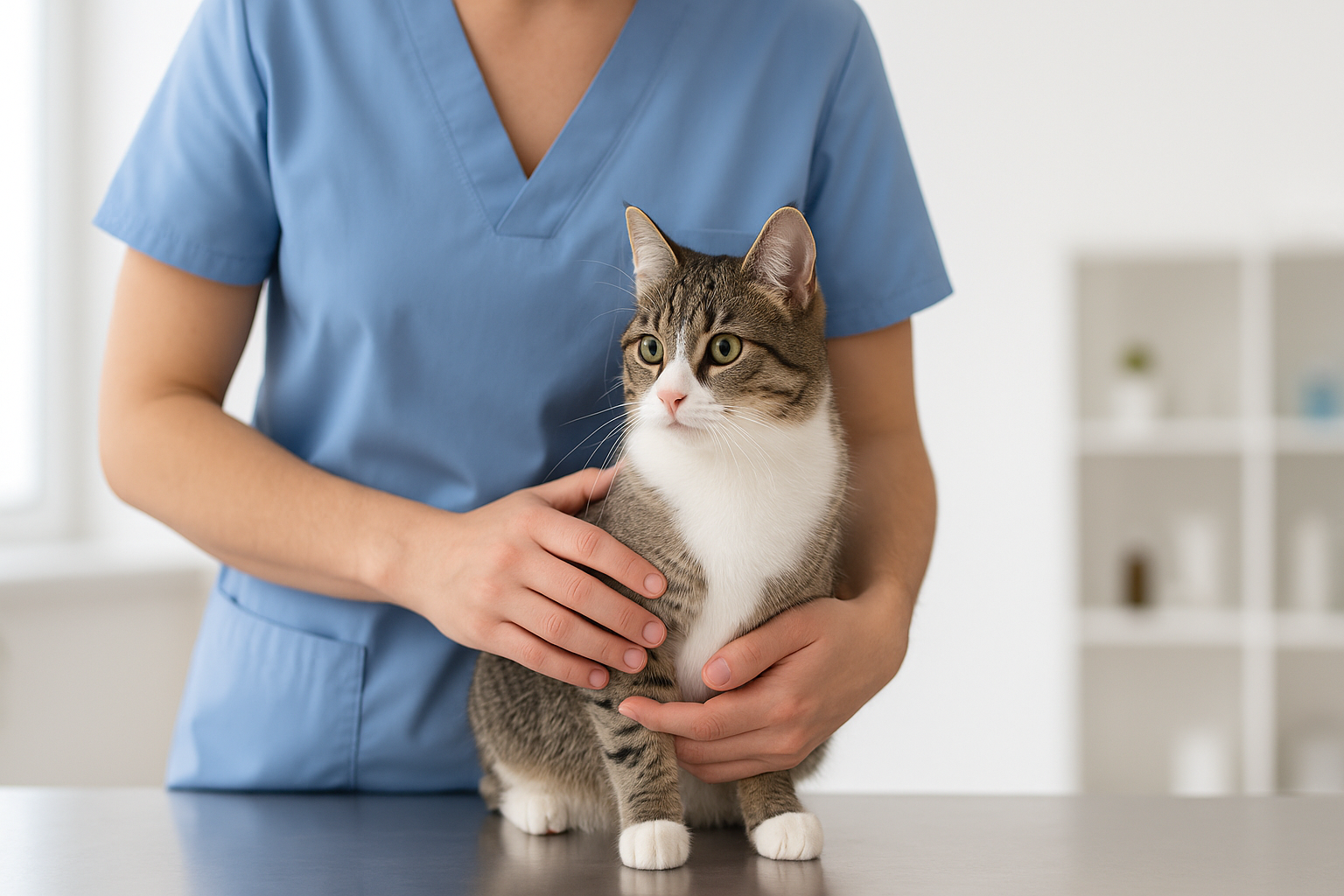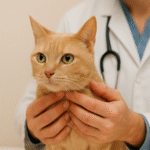If you’ve ever heard about parvo in dogs, you know it’s a serious and fast-moving illness. But can cats get parvo, too? The short answer is yes — though it’s not exactly the same virus that affects dogs. In cats, this dangerous illness is caused by the feline parvovirus, which leads to a disease called feline panleukopenia. You might also hear it called feline distemper, but it’s all the same condition — a highly contagious viral infection that can be deadly without quick veterinary care.
Let’s take a closer look at what parvo in cats really is, how it spreads, and the best ways to protect your feline family from this preventable disease.
What Is Parvo in Cats?
Parvo in cats is caused by the feline parvovirus (FPV) — a fast-acting virus that attacks cells responsible for immune defense, intestinal health, and bone marrow production. It’s one of the most serious feline infectious diseases veterinarians see, and it can be especially dangerous for kittens or unvaccinated cats.
Because FPV belongs to the same viral family as canine parvovirus, many people assume they’re the same. While they’re closely related, the feline parvovirus only affects cats, not dogs. Both viruses, however, share a frightening ability to spread quickly and cause severe illness.
Symptoms of Parvo in Cats
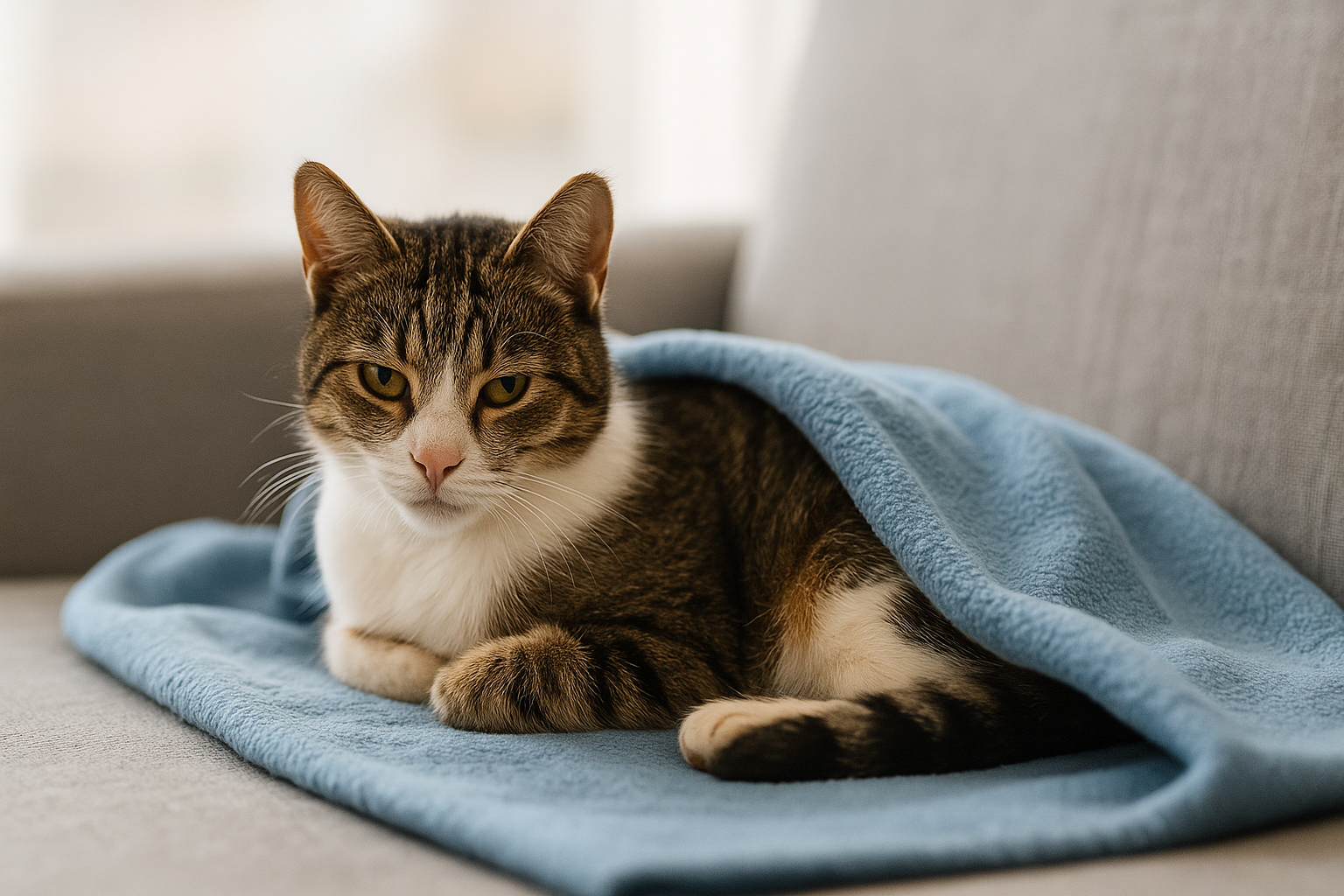
Early signs of feline parvovirus can look like many other illnesses, which is why prompt veterinary diagnosis is so important. Common symptoms include:
- Vomiting and severe diarrhea (sometimes bloody)
- Lethargy or extreme weakness
- Loss of appetite and rapid weight loss
- Fever or low body temperature
- Dehydration and sunken eyes
- Low white blood cell count (neutropenia)
Because the virus damages the intestinal lining, infected cats often can’t absorb nutrients or fluids. In kittens, the disease can also affect brain development, sometimes leading to cerebellar hypoplasia — a condition that causes tremors and coordination issues.
How Do Cats Get Parvo?
The virus spreads primarily through contact with infected body fluids — such as urine, feces, or saliva — or contaminated objects like food bowls, bedding, litter boxes, or grooming tools. Even a small amount of contaminated material can cause infection.
FPV is incredibly hardy. It can survive for over a year on surfaces and resist many common cleaners. Cats can also carry and shed the virus without showing symptoms, making it difficult to contain outbreaks in shelters or multi-cat homes.
Can Cats Get Parvo from Dogs?
This is one of the most common questions cat owners ask. While canine parvovirus (CPV) and feline panleukopenia virus (FPV) are close relatives, they are different enough that cats don’t typically get parvo from dogs — and dogs can’t get feline parvo either. However, there have been rare mutations (like CPV-2a and CPV-2b) that can infect cats under certain circumstances.
In short: cross-species infection is extremely rare, but both viruses spread through similar routes, so good hygiene and vaccination are critical for every pet in your household.
Diagnosing Parvo in Cats
If your cat shows symptoms such as vomiting, diarrhea, or sudden lethargy, see your vet immediately. Diagnosis typically involves:
- Fecal tests for parvovirus antigens
- Bloodwork to check white blood cell count
- Antibody testing to confirm exposure
Because FPV symptoms can mimic other feline illnesses like FIV or FeLV, laboratory testing is the only reliable way to confirm parvo.
Treatment & Recovery for Cat Parvo
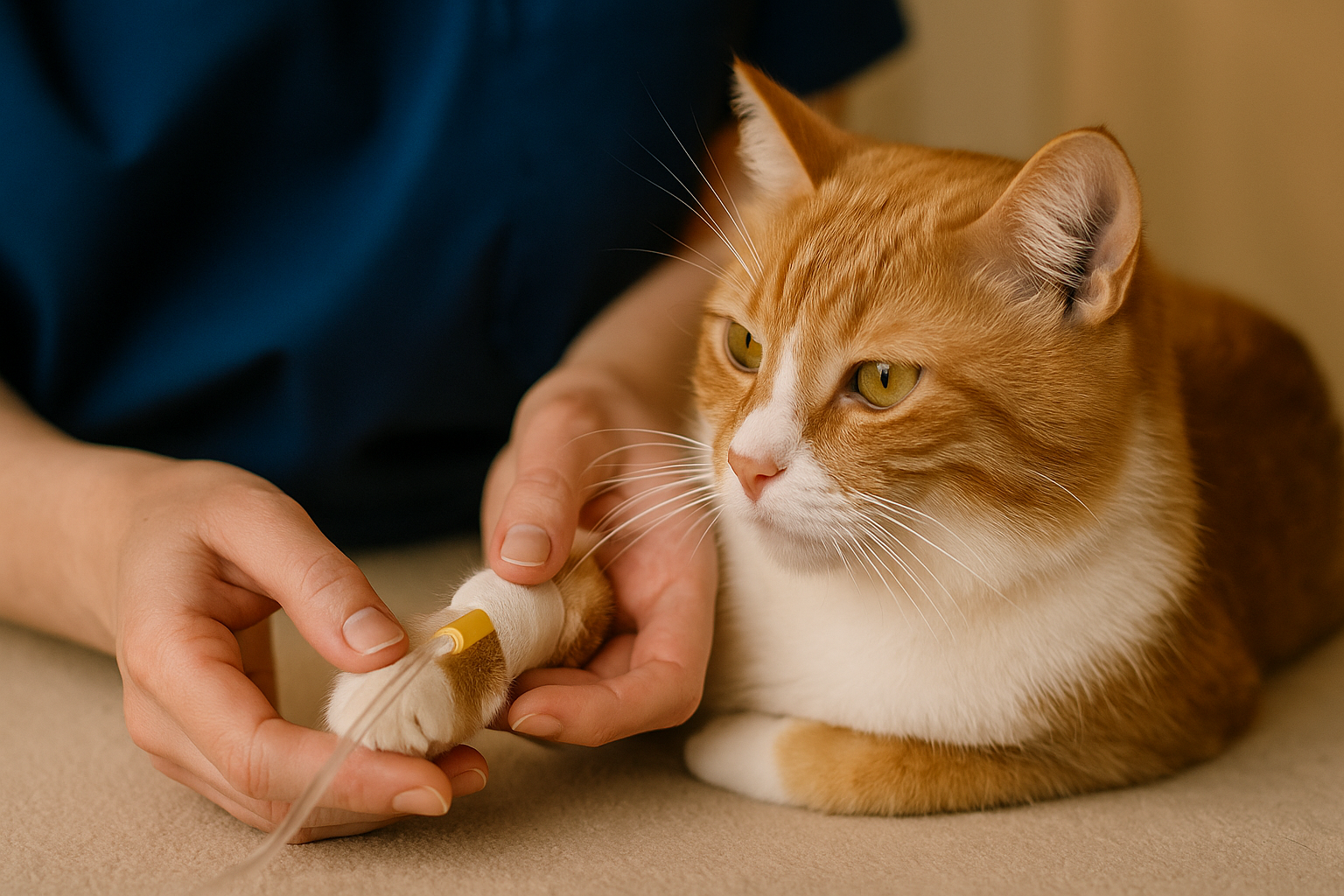
There is no direct cure for feline parvo, but supportive care can dramatically improve survival rates. Hospitalized cats are usually treated with:
- Fluid therapy to combat dehydration
- Antibiotics to prevent secondary infections
- Antiemetics to control nausea
- Nutritional support and careful feeding
In severe cases, blood transfusions or intensive nursing care may be needed. Cats that survive the first 5 days of illness generally have a good prognosis with proper care.
Can Indoor Cats Get Parvo?
Yes — even indoor cats can get parvo if the virus is accidentally brought inside. You might carry it in on your shoes, hands, or clothing after contact with contaminated areas or other animals. Because the virus can survive for months on surfaces, indoor cats still need routine vaccinations to stay protected.
Prevention & Vaccination
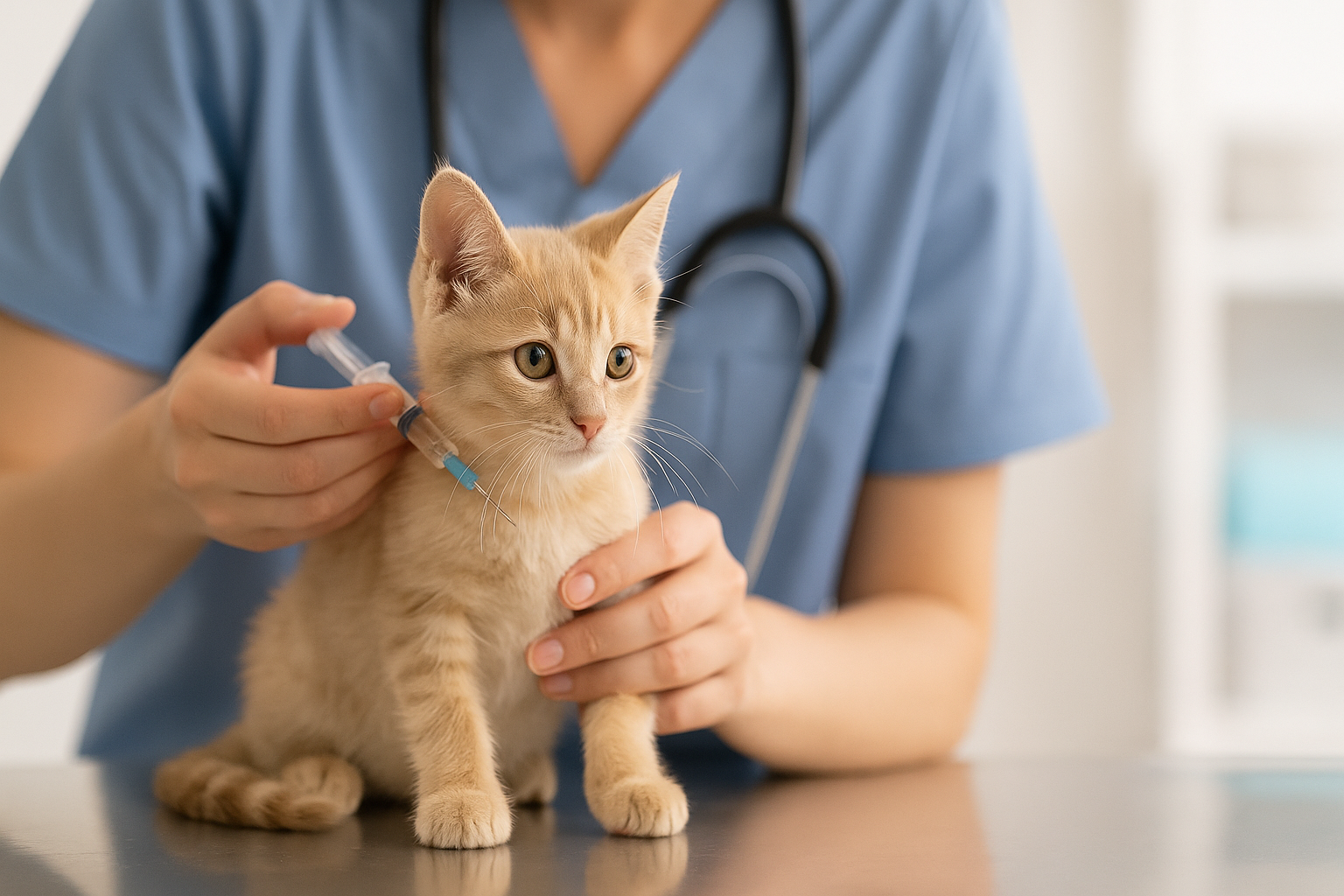
The best way to prevent parvo is with the FVRCP vaccine, which protects cats from feline viral rhinotracheitis, calicivirus, and panleukopenia. Kittens usually get their first shots between 6–8 weeks old, with boosters every 3–4 weeks until about 16 weeks. Adult cats need booster vaccines as recommended by your veterinarian.
Good hygiene also plays a big role. Disinfect litter boxes, bowls, and carriers regularly, and keep new cats separated for at least 10 days before introducing them to the rest of the household.
Can Humans or Other Pets Catch Parvo from Cats?
Parvo in cats is not contagious to humans. It’s a species-specific virus, so people don’t have to worry about catching it. Unvaccinated cats and kittens, however, can pass FPV to other cats through direct contact or contaminated surfaces. Dogs, while affected by a similar virus, don’t typically get sick from feline parvo.
If you have multiple pets, isolate any sick cat right away and disinfect shared spaces to stop the virus from spreading.
When to See a Vet
Call your veterinarian or an emergency animal hospital right away if your cat shows any of the following signs:
- Severe vomiting or diarrhea
- Sudden lethargy or collapse
- High or low fever
- Refusal to eat or drink
Fast action can make all the difference. Follow your vet’s advice about isolation, rehydration, and ongoing care once your cat returns home.
Can adult cats get parvo?
Yes. Adult cats can get parvo, though kittens are at a much higher risk. Unvaccinated adults exposed to the virus can still become seriously ill.
Can cats get parvo even if they’re vaccinated?
It’s rare but possible. Vaccinated cats are far less likely to contract parvo, and if they do, symptoms are usually mild. Staying current on booster shots is key to protection.
Can a cat get parvo twice?
Once a cat recovers, they usually develop lifelong immunity. Still, keeping up with regular vaccinations helps protect against other viruses.
Can cats get parvo from humans or dogs?
No. The feline parvovirus is species-specific, meaning cats can’t get parvo from people, and dogs don’t typically pass their version to cats.
What’s the survival rate for cats with parvo?
With prompt treatment, survival rates can reach 70–90%. Without veterinary care, especially in kittens, the disease is often fatal.
Keeping Your Cat Safe from Parvo
Feline parvovirus may sound scary, but prevention is simple with the right care. Regular vaccinations, clean living spaces, and quick action at the first sign of illness can keep most cats safe. Even indoor cats should stay current on their shots since the virus can travel on shoes, hands, or other pets.
If your cat ever shows sudden vomiting, weakness, or loss of appetite, don’t wait—call your veterinarian right away. Early treatment and supportive care can make all the difference. A little awareness today can help your feline friend stay healthy for years to come.

